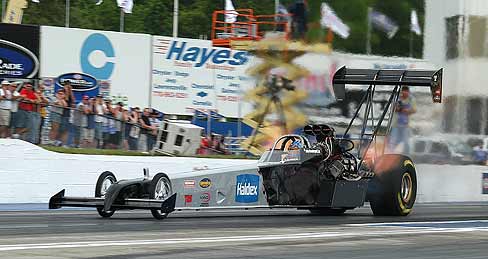|


DRO: How much
money do you need to race a full season?
Vandergriff:
It really depends on the sponsor’s goals
with the race team, but two-million dollars
will make you very competitive out here. I mean,
we finished in the top 10 every year spending
about that amount. Now, if you want to test
every Monday after every race, and you want
to have some R&D programs, and you want
to hire the best people, and people to manage
other people, and take that and consume every
moment trying to win a championship, it can
easily cost over three-million dollars. It just
depends on what the goals are. My previous sponsor
was more concerned with the products we sold
for them; as long as we had a competitive team,
that suited them just fine.
DRO: What
are the benefits of drag racing to a sponsor,
specifically a non-tool, non-beer or tobacco,
non-automotive parts company?
Vandergriff:
I think drag racing is a great fit for companies
that actually need interaction with the spectators.
If you’re just looking for mass television
numbers, then obviously NASCAR is a great fit
for that, but if you actually need to be able
to interact with spectators and show them your
product, show them how it works, or show them
why it’s better than your competitor’s,
then drag racing is the best fit.
We have these people here eight, 10, 12 hours
a day for three days, and between the times
when the pros are on, they’re looking for
something to do. So if you have something new
or something better, this is the best place
to show people. I mean, NASCAR’s great,
but the fans go from their cars to their seats,
watch for three or four hours, and then they
get back in their cars and drive home. There’s
no time for you to show them why your product
or service is better than somebody else’s.
They don’t want to talk to you; they’re
either late for the race or trying to beat traffic.
Drag racing doesn’t have that problem.
We have them here all day long and that’s
the kind of companies we try and target, those
that can benefit from actual interaction with
the fans.
DRO: Would
you also say an NHRA team sponsorship is more
cost effective than a NASCAR deal?
Vandergriff:
There’s very much a better dollar-to-return
ratio over here than in 99 percent of the programs
in NASCAR. You can go over there and spend 10
or 15 million dollars and it’s not going
to guarantee you anything, but you can come
here and spend two or three million and be one
of the heroes, and get your marketing message
across to basically the same demographics, the
same do-it-yourself-type guys—actually,
even more so in drag racing fans. It’s
a very cost-effective way to reach the same
customers and I wish more companies weren’t
so enamored with if they’re gonna’
be in racing, it’s gotta’ be in NASCAR.
I think if they just looked at us for dollar
per return, you’d see more companies coming
this way.
DRO: Did you
have a deal in the works with Coca-Cola or POWERade
before POWERade signed on as NHRA’s title
sponsor?
Vandergriff:
Well, we’d actually been educating POWERade
on drag racing and the opportunity, and obviously
they were very interested in our sport.
DRO: What
time frame was that?
Vandergriff:
Shortly before they became sponsor of the NHRA
drag racing series. I think when Winston pulled
out of the sport it provided POWERade an opportunity
that fit more with their corporate marketing
plan. NHRA had actually gone to Coca-Cola and
Coke passed on the opportunity, but made the
point that POWERade had been taking a look at
drag racing. So the opportunity to sponsor the
series was made to POWERade.

|